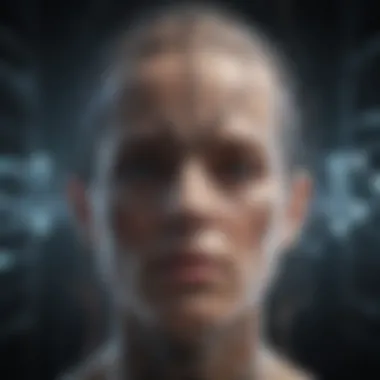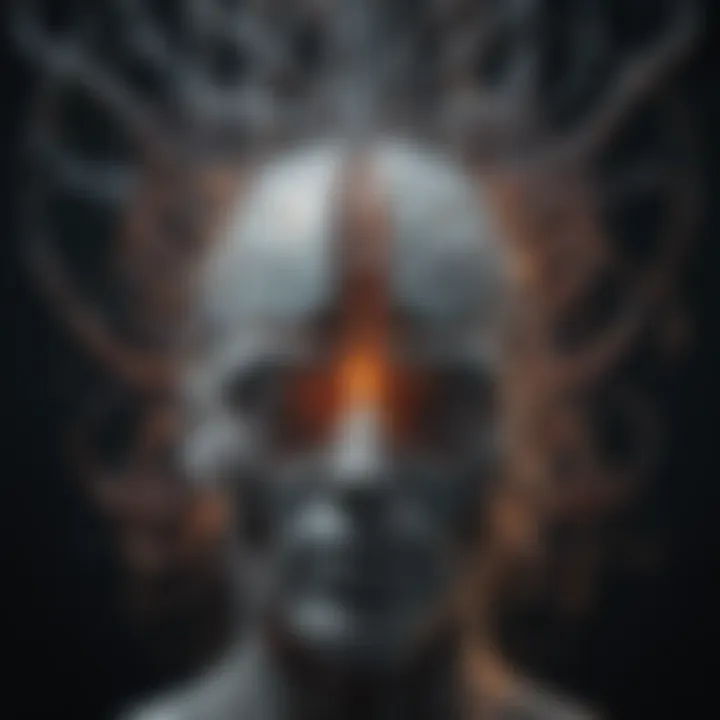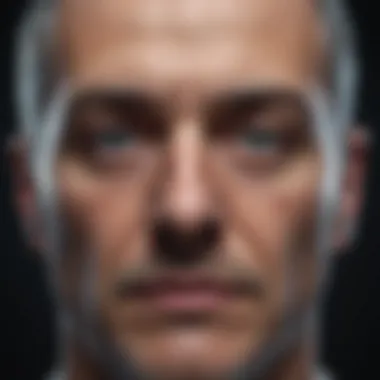Exploring the Depths of Conscious Consciousness


Intro
Consciousness, that elusive quality of awareness, has intrigued thinkers for centuries. Our mind wanders through a complex landscape when we ponder what it truly means to be conscious. As we delve deeper into this topic, it becomes abundantly clear that conscious consciousness isn't merely a phrase—it embodies the essence of our human experience. Understanding this nuanced interplay between consciousness and conscious experience enriches not only the scientific discourse surrounding mental function but also our day-to-day lives.
We live in an era where the boundaries between psychology, neuroscience, and philosophy blur, creating a fertile ground for inquiry into this topic. Quite often, these fields intersect and offer insights that challenge our preconceived notions about reality. By exploring consciousness through multiple lenses, we begin to grasp its implications for our interactions with the world. This exploration isn't just for academics or professionals; it resonates with anyone curious about their own mind.
In this article, we aim to embark on a journey through the intricate facets of consciousness. We'll highlight key points: what consciousness entails, its significance across various domains, and how it shapes our understanding of reality. Additionally, the discourse will consider the contributions made by influential figures in psychology, neuroscience, and philosophy, offering a comprehensive perspective on how conscious awareness impacts human experience.
Foreword to Conscious Consciousness
Understanding consciousness is no small feat; in fact it’s a complex web woven through our experiences, thoughts, and interactions. The concept of conscious consciousness forms a critical backdrop for this exploration and is pivotal in dissecting the myriad of nuances of human experience. By delving into this domain, one can not only appreciate the layers that exist within each cog of our being but also comprehend the intricate dance of thoughts and sensations that shape every moment.
At its core, conscious consciousness concerns itself with the way we experience awareness, the way we perceive our surroundings and understand ourselves. This is important, as it touches on different dimensions of our daily life, from decision-making processes to our emotional responses. It enables a deep understanding of how choices are molded not just by thoughts, but by that conscious awareness that sets us apart in our interactions with the wider world.
Furthermore, this section sets the stage for a deeper discussion across various scientific and philosophical perspectives, making a compelling case for interdisciplinary approaches to the study of consciousness. Understanding how we define consciousness, and the historical context of these definitions, shrouded in collective human thought, paves the way for clearer insights into the broader implications of this topic.
As we journey along this exploration, it becomes clear that preparing to navigate the terrain of conscious consciousness equips us to tackle questions that have lingered in the human psyche for ages, questions that deserve careful consideration and thoughtful dialogue.
Defining Consciousness
Consciousness, often described as the state of being aware, encompasses a multitude of experiences and interpretations. It's more than just a grand term; it's the lens through which we observe the universe. Some may define it narrowly, seeing it strictly as wakeful awareness. Others broaden this definition, encompassing a variety of mental states—from daydreaming to dreaming and upon through altered states.
The debate around defining consciousness can be elucidated through several points:
- Awareness of external stimuli: At its fundamental level, consciousness implies awareness of the surrounding environment, which can include sensory perceptions, reactions, and engagement with the world.
- Self-awareness: A more sophisticated aspect that includes reflection upon one's own thoughts, feelings, and existence. This layer brings forth questions about identity and the self.
- Subconscious influences: The interplay between the conscious mind and the subconscious. This is integral to understanding how much of our behavior is influenced by processes of which we may not be aware.
By comprehensively defining consciousness, we set the stage for a multi-faceted inquiry into its various dimensions, enabling us to navigate through the labyrinth of thought.
Historical Perspectives on Consciousness
Peering into the historical roots of consciousness might seem like traversing a winding path, yet it reveals the evolution of thought about what it means to be conscious. Philosophers like Descartes declared "I think, therefore I am" as a cornerstone idea, laying on the bedrock the connection between consciousness and existence. Fast forward through the ages, and you'll find figures like John Locke, who brought forth a theory of consciousness as tied to memory, emphasizing continuity.
Here are key milestones that trace the trajectory of consciousness:
- Ancient Philosophies: Major civilizations, such as the Greeks, often intersected rational thought with consciousness, recognizing its significance within the realms of ethics and knowledge.
- The Enlightenment: Marked a shift, as thinkers began to lock horns about reason in contrast to feelings, examining human experience through a critical lens.
- Modern Philosophy: This era saw the rise of phenomenology by Edmund Husserl and later existentialists like Sartre, who sought to integrate subjective experience into the characterization of consciousness.
Each perspective has carved a niche in the greater discussion. It's a patchwork quilt of concepts, each piece essential for painting a fuller picture of conscious consciousness. As we analyze these historical narratives, we open up channels for richer discourse about how conceptualizations of consciousness have impacted our understanding of ourselves as conscious beings.
Theoretical Frameworks
The exploration of consciousness at its core requires a robust theoretical framework, which serves as the backbone for understanding varied perspectives. By grounding the study of consciousness within structured approaches, we enhance the depth of inquiry and open pathways to meaningful discussions. This section will outline different philosophical and scientific views that illuminate the complexities of conscious experience. It is crucial for both academic and general audiences to appreciate these frameworks, as they greatly influence how we view consciousness itself and its implications for human cognition and behavior.
Philosophical Approaches to Consciousness
Philosophy has long been a bastion for pondering the intricacies of human existence. The discussion surrounding consciousness is no different. Various philosophical theories provide distinct lenses through which consciousness can be examined.
- Dualism posits a separation between mind and body, suggesting that consciousness exists independently from the physical realm. This concept has roots in the work of René Descartes, who famously stated, "I think, therefore I am."
- On the other hand, materialism asserts that consciousness is inherently linked to physical processes in the brain. Thinkers like Daniel Dennett argue that our conscious thoughts arise from brain activity, essentially dismissing the notion of a separate mind.
- Meanwhile, panpsychism, a less conventional view, suggests that consciousness is a fundamental quality of all matter, implying that even atoms possess some form of awareness.
These varied philosophical approaches provoke rich debates, illuminating the diverse interpretations of human experience. Each model brings its unique set of implications, raising questions about agency, free will, and existential meaning. It’s an ongoing dialogue that continues to evolve, reflecting our expanding understanding of consciousness itself.
Scientific Paradigms of Conscious Experience
Shifting from philosophy to science, we encounter a richly detailed landscape regarding consciousness. Scientific paradigms aim to delineate consciousness through empirical methods, often grounded in neuroscience and cognitive psychology.
- Neuroscientific Exploration: The advancement in neuroimaging technologies, such as functional MRI and EEG, has shed light on neural correlates of consciousness. These tools allow researchers to observe brain activities when individuals engage in conscious thought, revealing significant patterns connected to self-awareness and decision-making.
- Cognitive models also offer perspectives. For instance, the Global Workspace Theory posits that consciousness arises from the integration of information across various brain regions. When information is broadcast to a "workspace" of consciousness, it becomes accessible to broader cognitive processes, influencing behavior and action.
- Quantum Consciousness, explored by physicists like Roger Penrose and Stuart Hameroff, introduces a controversial paradigm. This theory contends that consciousness emerges from quantum processes within neurons, raising fascinating yet perplexing questions about the nature of reality and thought.
Understanding consciousness through scientific paradigms enhances knowledge of human cognitive functions and could potentially unlock new ways of addressing mental health issues or developing artificial intelligence systems. As with philosophical discourse, scientific inquiry into consciousness challenges existing notions and encourages interdisciplinary dialogue.
The interplay between philosophy and science in consciousness studies fosters a holistic understanding, revealing that neither domain can adequately address the enigma of consciousness in isolation.


Neuroscience of Consciousness
The field of neuroscience plays a pivotal role in unraveling the complexities of consciousness. Understanding how consciousness works necessitates an exploration of the brain's intricate networks, which serve as the foundation for both conscious awareness and unconscious processes. This knowledge shapes not only academic inquiry but also practical implications in fields like psychology and artificial intelligence. Insights derived from neuroscience make it possible to unlock the mysteries underlying human experience and behavior.
Neural Correlates of Conscious Awareness
At the core of neuroscience lies the investigation of neural correlates of conscious awareness. These are specific brain activities that correspond to conscious experiences, helping scientists distinguish between what is merely processed unconsciously and what reaches our awareness.
Research has shown that regions like the prefrontal cortex, parietal lobes, and thalamus are critical players in the expression of consciousness. For example, the prefrontal cortex is often associated with high-level cognitive functions, planning, and decision-making, while the thalamus acts as a relay station, channeling sensory information to other areas.
A compelling study conducted by researchers in 2016 revealed that stimuli which are conditionally perceived in unconscious awareness can still activate these brain areas, albeit in a muted form. This highlights the complexity of consciousness—certain signals may not reach our awareness yet still affect behaviors, indicating that the mind’s processing is more nuanced than many might think.
Furthermore, advances in neuroimaging technologies like fMRI provide windows into the brain’s inner workings, granting us the ability to observe which regions spark to life when a person becomes conscious of a thought or perception. Through these windows, we see that consciousness emerges not from isolated brain activity, but rather from the seamless interplay of various neural circuits—an orchestra of sorts.
Brain Structures Involved in Conscious Processing
Various brain structures are fundamental to what we experience as consciousness. The interplay among these structures enables us to interpret, react to, and remember the world around us. Each area contributes uniquely, weaving a fabric of conscious thought and awareness.
- Prefrontal Cortex: Engaged in abstract thinking, decision-making, and social behavior, this part is pivotal for self-awareness and understanding one’s own thoughts.
- Thalamus: Acts like a busy air traffic controller, managing sensory input and directing it to the appropriate cortical regions.
- Parietal Lobes: Crucial for integrating sensory information from various modalities, helping to create a coherent sense of existence.
- Hippocampus: Plays a key role in memory formation, linking experiences to context and thus influencing how we perceive our daily lives.
- Amygdala: Involved in emotional processing, it adds depth to our conscious experiences by coloring them with feelings, whether fear, joy, or nostalgia.
Neuroscientific findings shine a light on how injuries or abnormalities within these structures can lead to altered states of consciousness. For instance, strokes affecting the parietal lobe might result in a person becoming unaware of one side of their body, referred to as hemispatial neglect.
"Understanding the biological underpinnings of consciousness not only strides toward theoretical advancements but also fosters significant medical and ethical discussions, especially as technologies evolve."
The exploration of these brain structures deepens our comprehension of conscious experience, revealing just how reliant our awareness is on a systematic and intricate network. By understanding the connection between the mind and its biological substrate, we pave the way for further inquiries into consciousness, ultimately leading to more robust theories.
Consciousness is complex—yet every step into the neuroscience of consciousness brings us closer to answering questions that have puzzled humankind for centuries.
Psychological Dimensions
Understanding the psychological dimensions of consciousness is like peeking through a keyhole into the vast realm of human experience. These dimensions encompass the cognitive functions and unconscious processes that intertwine to shape our conscious awareness in profound ways. They offer insights not only into how we think but also into the subtler mechanisms that operate behind the scenes of our mind. This intricate interplay holds significant relevance for students, researchers, and professionals eager to grasp the complexities of human thought and behavior.
Cognitive Functions and Conscious Awareness
Cognitive functions, which include processes like perception, memory, and decision-making, are central to our conscious awareness. They serve as the building blocks through which we interpret the world around us. When we talk about cognitive functions, we dive into how attention flickers between stimuli, how memories resurface unexpectedly, and how emotions can sway our rationality.
One of the key elements here is the relationship between attention and consciousness. For instance, imagine walking in a bustling city. You're aware of various sounds and sights, yet only a fraction comes into sharp focus. This selective attention is a cognitive function that influences what we become consciously aware of at any given moment. It’s a bit like when you're in a crowded room and only hear your friend’s voice amid the clamor.
Research illustrates that cognitive functions can enhance or restrict conscious experience. For example, our ability to solve a complex problem relies heavily on our working memory, yet distractions can impede this process, leaving us feeling foggy.
The Role of Unconscious Processes
On the other end of the spectrum lies the role of unconscious processes, often overlooked in discussions about consciousness. These processes are like the hidden currents beneath the surface of a stream—powerful yet unseen. Our unconscious mind often drives our behavior in ways we might not fully understand.
Think about those moments when you suddenly recall an idea or a familiar face from the depths of your memory—that's often your unconscious mind doing the heavy lifting. It’s fascinating to note how unconscious processes govern a good portion of our daily actions. For instance, when a driver navigates familiar routes without consciously thinking about every turn—those automatic actions stem from well-established cognitive maps in our unconscious.
Moreover, psychological theories, such as Freudian principles and modern neuropsychological insights, illustrate how filters in the unconscious can shape conscious thoughts and emotions. Here, we can see how past experiences, beliefs, and even repressed memories subtly influence what we perceive and how we react.
Consciousness in Different States
Understanding consciousness in its varying states is a crucial facet of this exploration. It opens up avenues to grasp not just the mechanics of awake awareness, but also how our experiences transform when we shift into different mental realms. This includes anything from the day-to-day thoughts that run through our minds to altered states that break the mold of conventional understanding. These states can impact our perception, creativity, problem-solving skills, and overall experience of reality itself. Ignoring this complexity would be akin to reading a book with half the pages missing.
Altered States of Consciousness
Altered states of consciousness (ASC) represent a significant departure from our typical waking experience. They can arise from a multitude of sources, ranging from deep meditation and hypnosis to the effects of certain substances. ASCs often alter emotional responses and cognitive functions, providing profound insights into human consciousness.
For instance, consider someone meditating for an extended period. The state of deep focus can lead to feelings of oneness with the universe—sometimes referred to as transcendent experiences. In these moments, time may seem irrelevant, and emotional responses can vary, leading to heightened feelings of compassion or interconnectedness.
ASCs also play a role in therapeutic settings. Research indicates that psychedelics like psilocybin or MDMA can usher in new perspectives for individuals grappling with issues such as PTSD or severe depression. Clinical trials have shown promising results, suggesting these altered states can catalyze emotional breakthroughs and foster a deeper understanding of one’s psyche.


"The greatest discovery of my generation is that a human being can alter his life by altering his attitudes."
- William James
However, exploring ASCs involves navigating significant ethical and health considerations. While these experiences can be enlightening, they may pose risks if not approached carefully, particularly with substances. For this reason, establishing control mechanisms and understanding context is imperative.
The Nature of Sleep and Dreams
Sleep presents another intriguing dimension of consciousness, often dismissed as mere rest. Yet, this state is rife with curiosity and profound implications. Sleep can typically be divided into stages: REM (Rapid Eye Movement) and non-REM sleep. Each stage serves distinct functions in memory consolidation and emotional regulation.
Dreaming, particularly during REM sleep, offers a fascinating peek into our unconscious mind. Dreams often mirror our fears, desires, and thoughts we may not explore in waking life. For many, analyzing dreams can uncover hidden emotions or unresolved conflicts, giving insight not easily accessible in conscious thought.
Moreover, dreaming is not just personal; cultures worldwide view dreams through different lenses. For example, some Indigenous cultures perceive dreams as a gateway to receive messages from ancestors or engage with a spiritual realm. This view invites a broader inquiry into how collective beliefs shape our understanding of consciousness across various societies.
Both altered states of consciousness and the nature of sleep and dreams remind us that consciousness is not static—it’s a dynamic process. These states influence how we understand ourselves, interact with others, and perceive the world. The exploration of these elements doesn’t just enrich academic discourse but also speaks to the thread of humanity itself.
Consciousness Across Culture and Society
Understanding consciousness is not merely a psychological or scientific endeavor; it is deeply embedded in the cultural fabric of society. The lens through which different cultures interpret consciousness can significantly influence collective norms and individual behaviors. This section delves into the nuanced relationship between culture and consciousness, bringing to light how various societies perceive and integrate the concept of consciousness into daily life. Exploring these cultural interpretations offers valuable insights into the broader implications of consciousness for human experience and interaction.
Cultural Interpretations of Consciousness
Consciousness holds different meanings across diverse cultures. In some Eastern traditions, for instance, consciousness is often seen as a continuous flow, where individual selves are interconnected with the universe. This perspective encourages mindfulness and the understanding that one's consciousness is part of a larger, collective existence. In contrast, many Western cultures typically frame consciousness as an individual attribute, emphasizing personal identity and autonomy.
- Indigenous Cultures: Take the Maori of New Zealand, for instance. They view consciousness as interwoven with nature, where spirits of ancestors and the land coexist. Their rituals often promote a shared sense of awareness that transcends individual existence.
- Religious Influences: Various religions also play a critical role in shaping consciousness, such as the Buddhist notion of "Anatta" or non-self, which challenges the conventional understanding of individual consciousness.
By examining these cultural interpretations, we can uncover the profound implications for identity, ethics, and even governance. For example, recognizing the interconnectedness of consciousness can foster a greater sense of community care and responsibility, whereas a more isolated view may lead to individualistic pursuits that prioritize personal gain over the collective good.
Consciousness and Collective Human Experience
The fabric of society is woven from countless individual consciousnesses, merging into a collective human experience. This shared awareness contributes to the emotional and intellectual landscape of societies. It shapes cultural identity, societal values, and collective behaviors, highlighting the importance of understanding consciousness from a socio-cultural standpoint.
"The realization of self is often just the first step; the true journey is understanding the 'other' within the collective."
- Collective Memory: Events like wars, revolutions, or social movements are framed through the shared consciousness of a community. These shared experiences build narratives that influence future generations, reinforcing cultural identity and fostering resilience.
- Social Cohesion: The way consciousness is perceived can either unite or divide societies. For example, cultures that emphasize collective rather than individual consciousness might experience stronger social bonds and collaboration in community projects.
Technological Implications of Conscious Studies
The exploration of conscious consciousness has far-reaching implications, particularly in the realm of technology. By examining the interplay between consciousness and technology, researchers and practitioners can better understand how machines might not only mimic conscious behavior but also how they could potentially contribute to or interfere with human consciousness. In today's world, where technology is advancing at a rapid pace, understanding these implications is critical for both ethical considerations and practical applications.
Consciousness and Artificial Intelligence
The field of artificial intelligence (AI) raises profound questions about the nature of consciousness. As AI systems become increasingly sophisticated, the debate surrounding their potential for consciousness intensifies. Can machines truly possess awareness, or are they merely complex algorithms processing vast amounts of data?
Some scholars argue that conscious machines could eventually emerge, with the capacity to understand and reflect upon their existence. Others contend that, regardless of advancements, AI will always lack genuine self-awareness, functioning only as simulators of consciousness.
- Potential Benefits: Developing systems that understand consciousness could lead to enhanced human-computer interaction. For example, AI could be programmed to recognize emotional states, adapting responses in ways that make technology more intuitive and easier to use.
- Ethical Concerns: The creation of conscious machines raises valid ethical dilemmas. If an AI were to become truly conscious, what rights would it have? Can we justify creating entities that may experience suffering? These questions need careful consideration.
In this context, it’s useful to reflect on how consciousness is typically defined. Are we merely considering functional capabilities, or are there layers of self-awareness, intention, and subjective experiences that inform what it means to be conscious?
Neurotechnology and Consciousness Enhancement
Neurotechnology represents another fascinating aspect of the intersection between technology and consciousness. This area focuses on developing tools and methods that interact directly with the brain. The implications are astonishing, including potential enhancements to consciousness itself.
Neurotechnology can take various forms, such as neurofeedback, brain-computer interfaces, and stimulators that can influence brain activity. These advancements not only aim to treat conditions like depression or epilepsy but also offer opportunities to enhance cognitive functions.
- Cognitive Enhancement: Products like transcranial magnetic stimulation devices have been shown to improve attention and learning capabilities. Imagine a future where we can modify our cognitive abilities at will, fundamentally changing our relationship with knowledge and perception.
- Ethical Considerations: However, alongside these enhancements comes a slew of ethical implications. Who has access to such technology? Does cognitive enhancement further exacerbate existing social inequalities? In these discussions, it’s also important to consider what it means to be "normal" in terms of cognitive functions.
"The question is not whether machines can think like humans, but rather whether they can think at all."


Ethical Considerations in Consciousness Research
Research into consciousness is not just an academic venture; it holds significant moral weight and responsibility. The implications of studying consciousness stretch far beyond the confines of labs or lecture halls. As we delve deeper into understanding the nuances of conscious experience, several ethical considerations emerge that deserve closer scrutiny.
One crucial aspect revolves around the treatment of conscious entities, whether they be animals used in research or potential artificial intelligences that may develop awareness. How we define and recognize consciousness will significantly influence our interactions with these entities. The blanket assumption that humans hold the monopoly on consciousness could lead to skewed ethical frameworks. If we measure consciousness through behavioral responses alone, we may overlook subtle cues that indicate awareness in non-human animals, such as dolphins or elephants, who demonstrate complex social behaviors and emotional depth. This raises the question: should our ethical obligations extend to beings that exhibit signs of consciousness, albeit in different forms?
Recognizing the moral implications of conscious entities is vital. Ethicists argue that the capacity for suffering should guide our treatment of all conscious beings. If, for instance, future advancements in biotechnology lead us to create sentient machines, it will be imperative to reconsider how we approach their rights and welfare. What moral obligations do we have toward entities capable of feeling esteem, pain, or pleasure?
Therein lies a broader concern: The Dilemma of Consciousness in Biotechnology. As technology marches forward, the boundaries blur between organic consciousness and artificial constructs. The ethical framework guiding our evolution in biotechnology must remain robust as we explore profound questions related to consciousness.
The Dilemma of Consciousness in Biotechnology
With scientific advancements, we face potential scenarios previously seen only in the realm of science fiction. For example, neurotechnology can enhance human cognitive abilities, leading to a new understanding of what it means to be human. As we venture into realms involving neural implants or cognitive enhancement tools, we are invited to consider the moral implications: Are these enhancements helping society, or are they fostering inequality? Will individuals with enhanced consciousness initiate a schism between ‘normal’ and 'augmented' humans?
Additionally, there’s the unsettling prospect of creating artificial consciousness. We already see attempts to program AI with simulated feelings, but one must ponder: if these entities can exhibit behavior consistent with sentience, do they deserve moral consideration? Would the deletion of such an entity equate to erasing a consciousness? These dilemmas stretch our minds, forcing us to grapple with ethics that have yet to be defined adequately.
In summary, the ethical considerations surrounding consciousness research are multi-layered and profoundly important. They challenge us to rethink existing moral landscapes as we forge ahead. To ignore these implications could lead humanity down a path littered with ethical quandaries and dilemmas.
"The real challenge is not just understanding consciousness but understanding the ethical tapestry that it weaves among sentience and existence."
As we continue this frontier of exploration, it becomes clear that the melding of consciousness studies and ethics is not an add-on, but rather an essential foundation for responsible scientific inquiry.
Future Directions in Consciousness Studies
The examination of consciousness is a vast and often tangled web of ideas, disciplines, and frameworks stretching across historical eras and cultural contexts. Looking ahead, the journey of understanding consciousness is poised for radical transformation. The importance of future directions in consciousness studies cannot be overstated, as they not only expand our comprehension of the mind but also influence practical applications in various fields.
Emerging Theories in Consciousness Research
As we push forward into the future, emerging theories in consciousness research are starting to challenge long-held beliefs. Researchers are leaning heavily on interdisciplinary methods, converging insights from psychology, neuroscience, and philosophy. For instance, the Integrated Information Theory proposed by Giulio Tononi posits that consciousness corresponds to the degree of information integration in a system. This theory raises profound questions: What constitutes the integration of information, and how does this relate to consciousness itself?
Moreover, researchers are currently exploring the dynamics of consciousness through the lens of quantum mechanics, a realm that many initially considered too abstract for psychological inquiry. Quantum consciousness posits that brain processes could be influenced by quantum phenomena, suggesting that the nature of consciousness might be far more intricate than many assume. This theoretical shift urges a collaborative approach that brings physicists and neuroscientists into the debate.
"Experiencing consciousness is like trying to hold water in your hands; the more you clutch, the more it slips away. Understanding it may require redefining our fundamental assumptions."
In addition, models such as the Global Workspace Theory imply that consciousness is not a linear process, but rather involves a multitude of networks working in concert. These theories play a vital role in prompting fresh avenues of exploration, igniting discussions on the very fabric of conscious experience.
The Role of Interdisciplinary Approaches
Interdisciplinary approaches will shape the future of consciousness studies significantly. No single discipline can stake its claim to the entirety of understanding consciousness; it’s a puzzle that requires pieces from multiple perspectives to be fully grasped. For instance, neuroscience provides the biological underpinnings, while philosophy brings forth ethical considerations and thought experiments, and psychology affords insights into human behavior.
- Neuroscience: Delving into brain imaging and neuroplasticity can reveal how physical changes in the brain influence consciousness.
- Philosophy: Engaging discussions about the nature of self and personal identity challenge existing paradigms.
- Psychology: Research on cognitive biases and human behavior can illuminate how consciousness shapes our decisions.
Thus, harmonizing these fields can foster a more nuanced outlay of consciousness. Factors such as cultural backgrounds also enter the equation, allowing for a well-rounded understanding of how consciousness manifests differently across societies. Through collaboration, researchers can formulate dynamic hypotheses that may lead to groundbreaking discoveries.
In summary, the future directions in consciousness studies reveal an exciting landscape. With emerging theories that challenge the status quo and interdisciplinary collaboration drawing from varied fields, we stand on the cusp of innovative breakthroughs that could reshape the way we perceive consciousness—a vital aspect of what it means to be human.
Closure
The conclusion serves as the anchor in our exploration of conscious consciousness. It pulls together the threads woven through the article, summarizing key findings while also presenting contemplative thoughts about the future of consciousness research. Understanding the various layers of this intricate phenomenon is not merely an academic exercise; it holds profound implications for how we see ourselves and how we interact with the world around us.
Summarizing Insights on Conscious Consciousness
In revisiting the essential insights we have unearthed, several key points stand out. First and foremost, consciousness is more than just a state of awareness; it encompasses a realm of experiences that inform our perceptions of reality. This journey through its historical, neurological, and psychological dimensions reveals the complexity that defines our conscious experience. Knowledge about the asymbiotic relationship between consciousness and unconscious processes has emerged as fundamental. The cognitive functions we often take for granted—the ability to think, feel, and act—are deeply entwined with both our conscious and unconscious states. Thus, it shows that efforts to understand consciousness must traverse beyond simplistic definitions.
"Consciousness is not just in our heads; it's a complex interplay of thoughts, emotions, and shared human experiences."
Furthermore, cultural interpretations of consciousness spill into every aspect of human activity, shaping beliefs, traditions, and societal structures. How we interpret our conscious experience is honed by the society we inhabit. The relationship between technology and consciousness also deserves mention, as advancements influence our understanding and manipulation of consciousness. Specifically, with the rise of artificial intelligence, how we define consciousness in machines pushes ethical boundaries and inquiries about moral implications we did not previously consider.
Implications for Future Research
Looking into the crystal ball of consciousness research, we stand at a crossroads, filled with exciting possibilities and ethical dilemmas. As we advance technologically, the dynamism of consciousness studies will benefit from interdisciplinary approaches. The collaboration of neuroscience, psychology, philosophy, and even fields like computer science can yield more comprehensive insights.
Consider the exploration of altered states of consciousness through neurotechnology. Such tools could unlock new pathways for understanding mental health and cognitive function. Future research could even bridge the knowledge gap regarding the neural correlates of conscious experiences, helping us to distinguish between different states of awareness.
In addition, contemplating the moral implications of sentient AI raises crucial questions. Being able to ascertain the nature of consciousness in machines could redefine our understanding of personhood and rights. Addressing these questions will require robust ethical frameworks and a willingness to engage with diverse viewpoints.
In summary, the importance of consciousness studies cannot be overstated. They drive home the point that awareness, perception, and reality are not concrete; they are fluid and deeply interconnected. As we delved into this topic, each subsection played its role in building a narrative that invites further exploration—setting the stage for future inquiry and a richer understanding of what it means to be conscious.







